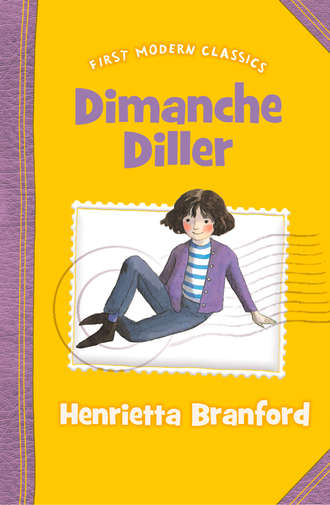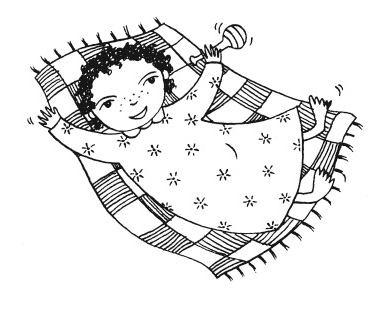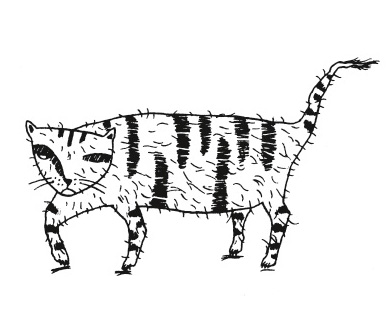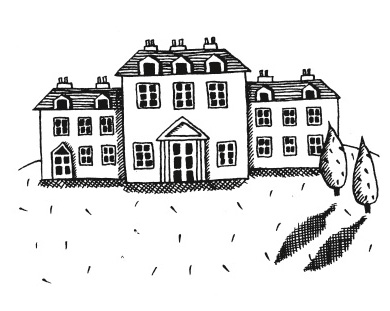
Полная версия
Dimanche Diller


WHY YOU’LL LOVE THIS BOOK
by Vivian French
Take one orphan (fun, feisty, and not in the least bit wimpy), add a wicked aunt (truly revolting and utterly vile) and a kind and enterprising nanny (full of brilliant ideas).
Mix them up with nuns, disguises and a mysterious traveller, and finally throw in Hilton Hall and millions of pounds. Result? A wonderful adventure story that’s very VERY exciting!
Vivian French
Vivian French is the author of over two hundred children’s books and several plays. She loves reading – especially books by Henrietta Branford.
To Polly
Contents
Cover
Title Page
Dedication
Chapter One
Chapter Two
Chapter Three
Chapter Four
Chapter Five
Chapter Six
Chapter Seven
Chapter Eight
Chapter Nine
Chapter Ten
Chapter Eleven
Chapter Twelve
Chapter Thirteen
Chapter Fourteen
Chapter Fifteen
Chapter Sixteen
Chapter Seventeen
Chapter Eighteen
Chapter Nineteen
More than a Story
Famous Orphans
Aunties and Uncles…
Brain-Teasers Mind Benders!
Polly’s Riddles
Traveller’s Tart
Final Fun and Games
Answers
Keep Reading
Also by the Author
Copyright
About the Publisher

One
Dimanche was three years old when Polly Pugh arrived at Hilton Hall, the house her parents had lived in before they were lost at sea when she was just a baby. And let me tell you right now, this is not one of those stories in which the missing parents turn up at the end. You must just take it from me that every now and then fate deals someone a cruel blow. It dealt Dimanche Diller several, and the first and the worst of them was the loss of her mother and father. This is how it happened.
Sailing in their yacht Hippolytus among the rocky islands of the Cyclades, the Dillers were set upon by one of those storms that seem to come from nowhere. In a matter of seconds the sea had turned from blue to purple, and billows of black cloud had blotted out the summer sky.
“Cut loose sheets, Dolores! We’re carrying too much sail,” Darcy shouted above the sound of creaking wood and snapping canvas. “Batten down the hatches! You and Dimanche man the lifeboat.”
Dimanche’s mother was nothing if not thorough, and it was her thoroughness, even in the face of mortal danger, that saved her baby daughter’s life. She bundled Dimanche into her tiny lifejacket, wrapped her in a blanket and tied her securely to the thwart. She kissed her, and turned towards her husband.
“Don’t wait for me,” he shouted. “I must belay the mizzen! You get in with Dimanche.”
At that very moment, a monster of a wave, as strong as steel, rose high above the little boat, hung for a moment like a cliff of glass, and crashed on to the deck. It cracked the boat from stem to stern, splintered the mast, ripped through the sails, and tore baby Dimanche from her mother’s arms, casting the lifeboat and its precious cargo adrift upon the sea.
Dimanche cried and struggled as the storm drove her fragile boat far to the south and west. All night the great waves surged, tossing the lifeboat like a cork. Salt sea spray soaked Dimanche’s blanket, and an east wind turned her tiny face and hands to ice.
At dawn the next day, a fisherman from Kithira saw what he thought must be an empty lifeboat, rising and falling on the steady swell. He pulled in his net, and rowed across to take a look, hauling the battered lifeboat alongside with a boathook. Imagine his surprise when, looking in, he saw Dimanche, lying in a tangle of blanket in the bottom!
“Aphrodite, Goddess of Love and Beauty,” he whispered, “who floated in her scallop shell past this very island, was not more beautiful than this child.” Tearing off his jumper, he wrapped the baby in it and rowed for home, marvelling as he did so at the birthmark on the baby’s wrist: it was just the shape of his own island of Kithira.
He and his wife were sorely tempted to keep the child, and how different this story would have been if they had done so. But they were parents themselves, and they could imagine all too well the frightful misery of this child’s mother and father, if they were still alive. Sadly they gave her to the village priest, whose job it was to care for foundlings.
The priest took Dimanche by plane to Athens, on the mainland, and handed her over to the police. By this time the wreckage of the Hippolytus had been discovered, washed up on the coast of Milos. Helicopters were searching every square mile of sea from Samos down to Crete and northwards to the Sporades but neither Darcy nor Dolores was ever found.
The Greek police handed Dimanche over to someone from the Red Cross, who flew her back to London and placed her in the loving care of the Sisters of Small Mercies. In due course the following advertisement appeared in the personal column of The Times:
FOUND DRIFTING IN THE MEDITERRANEAN SEA, it said, DIMANCHE DILLER, BABY DAUGHTER OF DARCY AND DOLORES DILLER, BOTH BELIEVED LOST AT SEA.
There was a number to ring and an address to write to.
If you are wondering how the nuns knew Dimanche’s name, it was because her mother Dolores was so very thorough. She had sewn tiny embroidered name tapes into every one of Dimanche’s clothes: her babygrow, her vest, her nappy, even her plastic pants, all bore her name in letters of pink silk. How did they know that Darcy and Dolores were the names of her late parents? The Greek Rescue Service had found the lost yacht’s log book, sealed in polythene and washed ashore with the wreckage. It gave them details of her course, and the names of the three people who had sailed in her. So far as anybody knew, it was all that remained to Dimanche of her dear parents.

Two
I’m sorry to tell you that there were hundreds of bogus replies to the advertisement. It occurred to many people that an orphaned baby, sole survivor from the wreck of a luxury yacht, might well be worth a fortune, even though she was just a tiny, helpless baby, unable so much as to wipe her own nose – or anything else, for that matter. The nuns sensibly decided to ask the police for help, and Chief Superintendent Barry Bullpit took on the case. He went over each and every person who claimed to be a relation of Dimanche’s most carefully, and rejected all of them.
For a while, no further candidates came forward. The nuns made a great fuss of baby Dimanche, and she had as nice a time as any orphan can. Mother Superior carried her up and down whenever she cried. Sister Sophia and Sister Catriona made her a little hammock to remind her of her seafaring days with her dear parents, and slung it between two lilac trees in the convent garden. There they would rock her gently, singing songs and sea shanties and even, I’m sorry to say, arguing with one another over who should be allowed to change her nappy.

Three
It was almost one year later that a large, bad-tempered person whose name was Valburga Vilemile noticed the advertisement in an old copy of The Times, which she was using to line her cat’s earth tray.
Most cats are clean and independent animals. Not Cyclops. He was a cowardly bully, too lazy to go outside to do his business. He insisted on a smelly earth tray in the kitchen, and he would not attempt to defend his territory in the garden and chase out other torn cats – the only cats he’d fight with were not cats but kittens. He had a matted coat the colour of mud and his tail was thin and stringy because he never washed at all. His legs bent outwards at the elbows under the weight of his body and he had, as you’ll have guessed, only one eye. For all that, his mistress loved him, which only goes to show that there’s a trace of good in even the meanest person.
Valburga paused in her revolting task, adjusted her hat, and scanned the Personal Column. FOUND ADRIFT… she read. DIMANCHE… BELOVED DAUGHTER OF DARCY AND DOLORES… She read the whole advertisement. She read it several times, and stopped to scratch under her hat. All her life she had thought a great deal about money and how to get it. It did not take her long to come up with a plan.
“If we play our cards right, Cyclops,” she said, “this could mean champagne for me and caviar for you. Pickled sturgeon-roe, Cyclops. How about that?”
Valburga went at once to her local library and looked in a large book called Who’s Who. It lists all sorts of rich and famous people, and says where they live and what they like to have for breakfast, how many children they have and what their favourite pastimes are. She soon found Darcy and Dolores Diller, and was pleased to find that their ancestral home was Hilton Hall, a handsome mansion overlooking the little village of Hilton in the Hollow. By lucky chance this was the very place where her old schoolfriend Gussie now held the job of post mistress and village shopkeeper. Gussie and Valburga had been pupils at Coldcrust Court Approved School for Girls. They shared happy memories of midnight feasts, impromptu bonfires, and other diversions. Valburga felt sure that Gussie would help her with her plan.
She disguised herself with a wig and a pair of dark glasses, and went straight to Hilton Hall. There, posing as a double glazing salesperson, she made young Cosmo the gardener show her round the whole house. While pretending to measure the huge old windows in the drawing room, she was able to take a quick look in Darcy Diller’s desk. She removed a photograph and a letter, both of which she felt sure would come in useful.
She also spent a morning in the local church, looking at plaques and gravestones. She told the vicar that she was writing a book about the historic village of Hilton in the Hollow. She asked him to tell her all about everyone who lived there, but he soon smelt a rat and sent her packing. So she went along to the Post Office, and spent a happy evening chewing over old times with Gussie, and listening to all the gossip of the village.
By the end of three days she knew all about Hilton in the Hollow, and everyone who lived there. “Now for my habit,” she said to Gussie. This needed a visit to a theatrical costume maker, and Valburga found one in a nearby town without much difficulty.
Just seven days later this neatly written letter arrived on Chief Superintendent Barry Bullpit’s desk:
Cher Monsieur,
I am the last remaining relative of the child Dimanche Diller. I have been living in a convent in France for some years, following a tragic personal loss. It is for this reason that I have only just happened upon the advertisement announcing the death of my dear sister Dolores and her husband Darcy, and the lone survival of their daughter, my niece, dearest Dimanche.
I long to be reunited with her. Please arrange it as soon as possible.
Your sincerely,
Sister Verity Victorine.
P.S. I enclose a photo taken of myself with my sister Dolores shortly before my departure for France. Of course I have not met my little niece. She was not yet born by the time I left this country. However, I feel I know her intimately from my dear sister’s letters – even down to the dear little birthmark on her wrist, that is shaped like the island of Kithira.
The letter was sealed with a blob of red sealing wax in which were stamped the letters VV.
The Chief Superintendent read the letter carefully, and studied the faded old photograph. He scratched his chin, and studied them again. He sent them across to the forensic laboratories for testing. He ran them through the police computer backwards, forwards and sideways. He gave them to sniffer dogs to sniff, and to experts to analyse. He took them home and showed them to his wife. In the end he decided that they were genuine. Even the best policemen make mistakes, as you will see by reading any newspaper.
Barry Bullpit invited the writer of the letter to meet him at the convent of the Sisters of Small Mercies, having first checked with Mother Superior as to when would be a convenient time.
“No time,” poor Mother Superior whispered in her heart of hearts. “No time would be convenient for you to take Dimanche from us.” But, just like the fisherman’s wife in far-off Kithira, who still thought often and longingly of the baby from the sea, she knew it was her duty to return Dimanche to the bosom of what family she had left. “Come to tea on Tuesday,” she said graciously. “Bring Sister Victorine. Every orphan deserves a long-lost aunt.” Mothers Superior also make mistakes.
It was not a happy meeting. The nuns gathered sadly in their sunny parlour. Honey from their own bees, bread baked in their own ovens, fruit teas made from rosehips and camomile picked from the convent garden, and golden butter churned by the sisters’ careful hands lay like treasure on the linen cloth. Sun streamed in through the stone-arched windows and lit on little Dimanche, sitting in her high chair and banging on her tray with a silver spoon. Sister Sophia sat on one side of her and fed her titbits of bread and honey dipped in milk. Sister Catriona sat on the other and dabbed at the little girl’s chin and fingers with a soft napkin. It was a sight to bring joy to any heart, but the hearts of the Sisters of Small Mercies were filled with sorrow.
Mother Superior sat at the head of the table, with the chief superintendent on her left and Dimanche’s long-lost aunt on her right. The Sisters of Small Mercies were quite surprised by the aunt’s appearance, perhaps because she was one of those people who seem to be bigger than their clothes. She was not fat in that nice, billowy way some people are, so that when you lean against them you feel comfortable. No. She was fat in a bossy, get-out-of-my-way-or-I’ll-squash-you-flat sort of way. Her face, what they could see of it behind her veil, was reddish. Not a nice reddish-brown, like someone who’s been outdoors a lot, but an I’m-so-angry-I-may-explode-at-any-minute sort of red. She wore a signet ring on her little finger with her initials on it: VV. Her heavy veil made eating and drinking quite difficult for her and she spilled cake crumbs down the front of her navy blue habit. She got her tea cup mixed up with her rosary, and she forgot to wait for grace. She seemed to the Sisters to be a peculiar sort of nun, and not a very nice one. They supposed that her strange ways had something to do with her having lived abroad. French nuns are quite different from us, they thought. None of them had ever been to France.
Dimanche was placed at the far end of the table from her visitors, because she was inclined to throw things. The nuns didn’t mind a bit, but they felt it better that such important visitors should be seated out of range. The strange Sister didn’t in any case seem anxious to get close to her niece. When Sister Sophia held her out to be kissed, she backed away as if she had been asked to kiss a spider.
“It is a great sacrifice to one of my powerful vocation,” she told them, “to leave my dear convent and all my dear Sisters in France. But my Mother Superior says that I must do my familial duty, and I am accustomed to obeying her in all things.”
Dimanche stared doubtfully up from Sister Sophia’s lap at her new-found relation, and dribbled.
“Oh, the darling,” murmured Sister Catriona, dabbing at her chin with a bib. “Isn’t she enchanting?”
Dimanche’s new aunt did not look enchanted, in fact she looked revolted, but she did her best to disguise her feelings. The veil helped. If they had been able to see through the veil, the Sisters of Small Mercies would have found her face most unpleasant.
“Time to go,” the strange Sister announced, as soon as tea was finished.
“Already?” faltered Mother Superior. She wiped her eyes and frowned at Sisters Sophia and Catriona, who were beginning to sob. “Please understand, Sister Victorine, that here at the Convent of Small Mercies, we have grown to love Dimanche very much. We are glad, of course, as we ought to be, that you have come to claim her. It’s a wonderful thing to have your family around you, and we wish you every joy with little Dimanche. But we cannot help crying, now that it’s time for her to go.”
“There is no need for you to give her another thought,” said the strange nun crossly. “I shall engage someone suitable to care for her until she’s old enough to go to boarding school. I shall choose one in the north of England, one with plenty of discipline and outdoor activities. How lucky she is that I noticed your advertisement! Now, put her in the pram, ladies, I mean Sisters, and we’ll be off.”
“Where are you taking her, Sister Victorine?” asked Mother Superior. “If it’s not too far away, we would so love to visit her.”
“That will not be possible. I’m taking her to our ancestral home at Hilton in the Hollow. It is a remote spot, and inhospitable.”
“But you will write to us, Sister Victorine?”
“Probably not. I shall have my devotions to attend to, as well as my niece.”
There was not a dry eye in the convent as Dimanche was tucked into the big black pram that the nuns had bought for her, and wheeled away towards the station. Even Chief Superintendent Barry Bullpit had to wipe away his tears. He was not an emotional man, but when he was telling his wife about it that evening, he found himself crying all over again.
“I can’t explain it, Beryl,” he said. “Seeing that scrap of an orphan lying there as good as gold, and that old dragon of a Sister pushing her away down the road in a big black pram, and the poor nuns crying fit to burst, it got to me.”
Beryl Bullpit made her husband a cup of hot chocolate and sat him down in front of the TV.
“You watch the sport, Barry,” she advised. “And don’t upset yourself. Your job is not an easy one.”
As for the nuns, their last glimpse of their precious foundling had to last them for many a long year. It was a good thing that they were able to find solace in prayer, otherwise I’m sure their hearts would have been broken.

Four
The journey should have been a dismal one for little Dimanche.
Her new aunt left her alone in her pram in the luggage compartment, with a bottle of cold tea propped beside her pillow, and went off by herself for cakes and ale in the restaurant car.
If it had not been for a kind-hearted guard called Winston, who knows how Dimanche would have managed? Fortunately, Winston was a father and a grandfather, and what he didn’t know about babies wouldn’t fill a thimble. He fetched warm milk, and banana sandwiches, and made Dimanche’s journey pleasant by singing to her.
Valburga Vilemile did not show up until the train pulled into Hilton in the Hollow station. Winston felt extremely angry with her as he helped her down with the pram.
“Look here, Sister,” he said. “You may be a nun but you don’t know a thing about babies. Babies need plenty of attention. They need food and drink all the time. They need conversation. They need looking at, picking up, and singing to. They need cheerful and abundant company by day and by night. Why d’you think their parents look so tired?”
“I suggest, my good man, that you confine your attention to the serving of tea and coffee, the lifting down of prams, and the occasional clipping of tickets,” Valburga replied. “Unless you wish to be reported to your superiors for insolence.”
Winston shook his head and clicked his fingers. He peeped into the pram. “Good luck, little one,” he murmured. “You’re going to need it.”
How right he was.

Five
Dimanche’s new life, without her parents, or the nuns, and with her peculiar new aunt, was not an easy one. Dozens of nannies passed through Hilton Hall, and some were delightful and some were frightful but all of them gave in their notice within a month or two.
Those who liked babies at all loved Dimanche. They couldn’t help it. She was adorable. By the time she was two, she was running up and down the long gloomy
corridors of the big old house, opening doors, turning out cupboards, posting things down the lavatory, investigating dustbins, and doing all the things an enterprising baby should do. Her curly dark hair shone like hens’ feathers, and her round, brown eyes peered out from behind her fringe in a way that made you think of a hedgehog under a bush. Her little fat feet went pitter patter on the stone-flagged floors, leaving behind them a delicate tracery of tiny footprints marked out in whatever it was she had most recently been playing in – mud, if she’d been in the flower beds; sand, if the sandpit; talcum powder, if the bath. It drove her aunt wild. “Clean this mess up!” she’d shout at the unfortunate nanny. “Do it now and do it properly! Lock the child into her room and don’t let her out!”
The better ones would kiss Dimanche goodbye and head for the station at this point. Nobody nice would agree to shutting a two-year-old into her bedroom, after all. The nastier ones would linger on a while, and during these times Dimanche would have been truly unhappy if it hadn’t been for Cosmo the gardener. He would tiptoe up the back stairs with a punnet of strawberries or a bowl of redcurrants in his hands, or a bunch of crunchy carrots, or a tomato warm from the sun. “Look what I’ve got for you, Dimanche,” he’d say. He’d shoo Cyclops away – he couldn’t abide cats because of the way they caught nestlings in the spring, and dug up his flower beds. Then he’d sit down beside Dimanche and feed her titbits, and tell her stories, and show her interesting things from out-of-doors.
He brought her a last year’s blackbird’s nest, all scratchy and rough on the outside, but lined with mud as smooth as satin on the inside. He brought her hairy caterpillars to look at, and snail shells to add to her collection, and sometimes a frog in his hat. If he brought something alive, they would watch it together for a while before returning it carefully to that part of the garden where Cosmo had found it.



